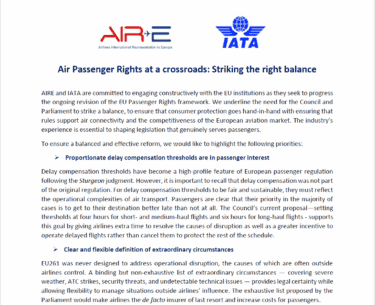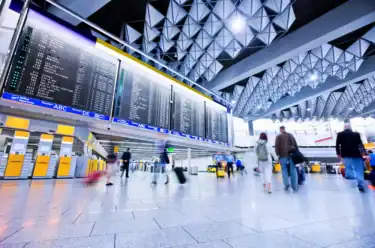The proposal for the revision of the Energy Taxation Directive (ETD) is based on the assumption of removing exemptions and harmonizing the taxation of energy products within the EU, with a particular focus on imposing an additional burden on fossil fuels.
The draft containing new rules establish a minimum rate of tax on fuel used for intra-EU passenger flights, as well as ferries, fishing and cargo vessels within the EU. This means the abolition of the current tax exemptions for aviation fuel for all the flights (except for cargo flights). Member States are to remain free to set a higher rate than the minimum rate set out in the directive and will be given the opportunity to extend these regulations to flights outside the EU through international agreements with third countries.
AIRE will actively engage with policymakers to highlight the economic and competitive disadvantages of the proposed Energy Taxation Directive (ETD) Revision on the aviation sector.
Consequences of the adoption of such measure:
- The sector already faces a double fiscal burden due to the EU ETS and CORSIA systems. Carriers burdened with fuel taxes, the ETS system, and mandatory sustainable fuel (SAF) minimums will be at a disadvantage in market competition. For instance, the combined effect of ETD and ETS is expected to result in the loss of 77 million passengers to airports outside the EU[1].
- Shortage of funds for investment. Leverage of further economic stress on European carriers will critically limit their investment capacity in development of low-emission fleet. Inventing and acquiring the state-of-the-art planes are essential to reach the target of emission-free aviation.
- Disruption of supply chains. Additional taxation of aviation fuel on European routes will have a destructive impact not only on the aviation market, but also on the entire supply chain of goods and services related to transport and tourism.
- De-harmonization with global standards. The lack of tax on aviation fuel results from applicable international agreements (Chicago Convention).
- The process of sector transformation will be delayed due to the weakened ability of European airlines to innovate and modernize their fleets. Therefore, there may be a global increase in emissions as carriers take detours to avoid taxation. Cheaper destinations in close proximity to the EU, with lower travel costs, will benefit at the expense of EU tourism and a significant portion of society will be economically excluded from intra-EU mobility due to a substantial increase in ticket prices.
AIRE considers that the proposed revision of the Energy Taxation Directive (ETD) poses significant challenges to the EU civil aviation sector, threatening its economic stability, competitiveness, and ability to innovate. AIRE urges policymakers to carefully consider the extensive negative impacts on aviation, emphasizing the importance of preserving the sector’s role in the EU economy and global connectivity.
[1] Steer (2002) Carbon leakage risks from the scope of aviation policy measures in ´Fit for 55´.


